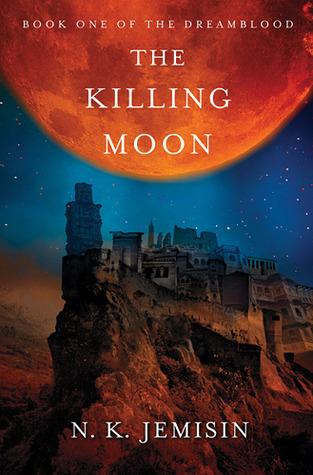
It only took one book for N.K. Jemisin to be added to my "authors to follow" list, and three books into her worlds, I see no reason to change that. Given that I read that this was written before the Hundred Thousand Kingdoms but published after, it's possibly even more impressive. This is a fantasy world I was thoroughly absorbed by, and I'd recommend it to anyone looking for some work in the genre.
In particularly, I was impressed with the clash of cultures Jemisin depicts in The Killing Moon. We get two countries, each drawing on the same religious heritage, but with diametrically opposed views of the magic that lies at the centre of this book. One abhors it, preferring to abstain than tread the moral uncertainty of using it. The other tries to regulate it, use it wisely, but leaves itself open to horrors committed by those who enjoy power.
What is particularly amazing to me is that I still don't know which side is better. Jemisin writes complexity so well that the beliefs of both societies are perfectly understandable, and neither has a clear moral superiority over the other. I understood the intellectual and the emotional urgency of both, and I still am undecided. That's quite a feat, and much better than the clear preference for one society we see in so much fantasy.
I'm talking in generalities and the particulars here are worth discussing. In Gujaareh, the magic of one of the moons and the goddess it represents is channeled into a complex system of dreamblood, one of four humours, this one with the power of healing. People are obligated to donate, but if they are old or ill, or corrupt, the Gatherers can go and send them peacefully into a dreamland afterlife. For some, it's a blessing. (It's supposed to be a blessing always.)
Of course, deciding who lives and dies is a fundamentally difficulty process, one open to corruption itself. The Kisuati have decided that no one may use these powers at all. An easier decision, perhaps, but a better one? Also perhaps.
Sunandi, an ambassador from the Kisuati is in Gujaareh when the people who decide give her life to a Gatherer to collect. She is able to convince Ehiru, the Gatherer that perhaps the choosing process has been perverted, and as a fervent believer in what he does, he suspends justice. Sunandi, Ehiru, and his apprentice fight against time and death to figure out who is holding power in Gujaareh and what they intend to do with it.
This is a great adventure through power and its effects, its perversions, what people might do with dangerous knowledge, depending on who they were and what they believed. The characters are vivid letting us explore this through its effects on them. Plot and characters really work together beautifully. Jemisin shines when she writes about power and how it is expressed and embodied.
I enjoy the complexity, the idea, the characters. There's really nothing here I didn't like. I'm very glad I discovered Jemisin, and am looking forward to the other books of hers I have not yet read. It's a delightful feeling.
No comments:
Post a Comment